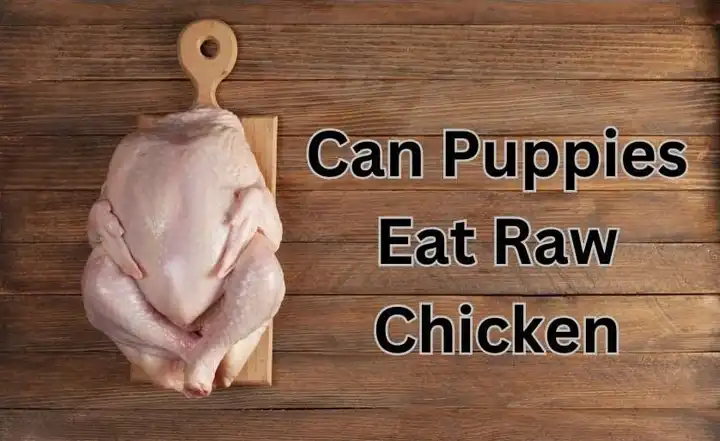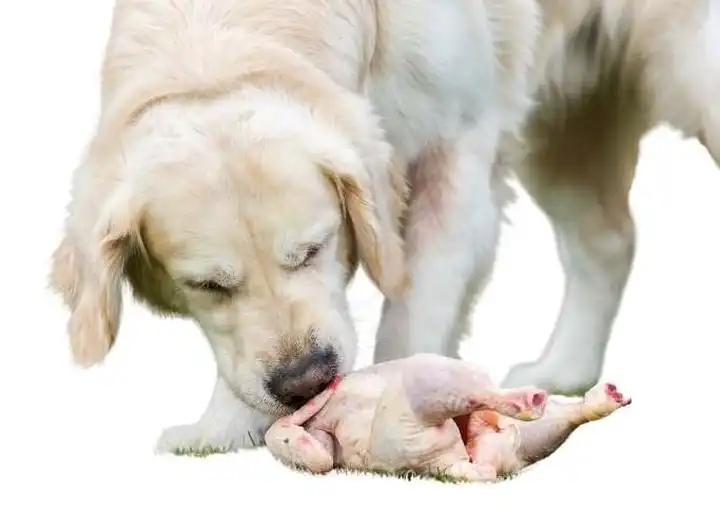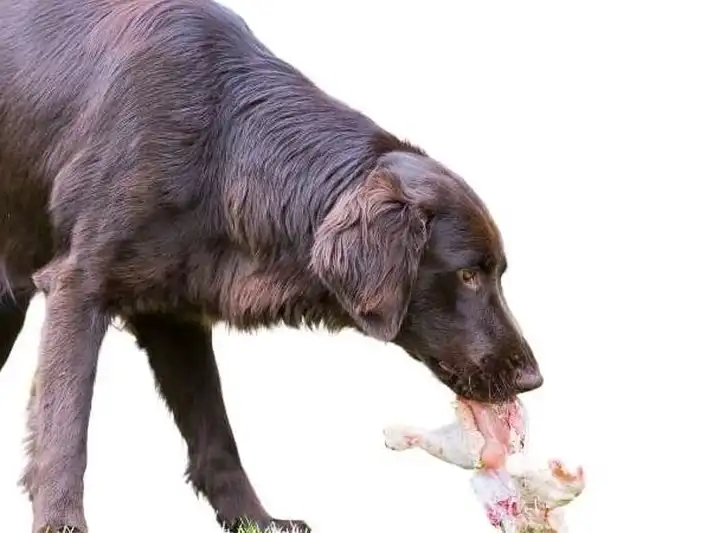
Can Puppies Eat Raw Chicken?
Yes, but it has potential risks. Feeding a raw chicken diet to puppies needs meticulous care and adherence to safety procedures.
While raw chicken can deliver nutritional advantages, such as high-quality protein, it’s vital to comprehend the risks of bacterial infection, dietary imbalances, choking hazards, and the risk of parasites.
It’s suggested to consult with a veterinarian to secure the puppy’s health. They can provide personalized advice on your puppy’s requirements and assist you in deciding your diet.
Is Raw Chicken Safe for Puppies: A Comprehensive Analysis
There is considerable debate among veterinarians, pet nutrition specialists, and dog owners regarding feeding it. Understanding the risks and help is necessary before deciding if it’s the right option for your puppy.
According to the (AVMA), raw animal-source protein in puppy and cat diets can cause several health issues. These problems range from minor digestive disturbances to severe illnesses like salmonellosis and Campylobacter infection.

It can be a breeding base for harmful bacteria like uncooked meat. While a puppy’s stomach acid can typically kill many forms of bacteria, their developing immune systems make them particularly susceptible to these bacteria, which can cause severe gastrointestinal issues.
Dr. Jerry Klein, Chief Veterinary Officer of the American Kennel Club, states that raw meat diets are not correctly balanced to feed a dog with the correct levels of nutrients. They often have excessive amounts of certain nutrients, like protein, and lack sufficient levels of others, like calcium.
Read Also: Can Puppies Eat Strawberries? Nutritional Benefits, Risks, and Precautions
What You Need to Know about the Risks
Feeding raw chicken to puppies isn’t just about the potential risk of bacterial infection. Understand that there are different elements to think about.
Nutritional imbalance.
Raw chicken is high in phosphorus and low in calcium. Puppies, especially those in their growth phase, need a balanced calcium-to-phosphorus ratio for proper bone development.
If a puppy’s diet consists mainly of raw chicken (or any meat), it could lead to calcium deficiency and excess phosphorus. Over time, this imbalance could result in a condition called Nutritional Secondary Hyperparathyroidism, causing poor bone density, skeletal abnormalities, and in severe cases, fractures1.
Risk of choking or internal damage.
Raw chicken bones can be safe for dogs to chew on; however, there’s always a risk of choking, especially for small puppies. Moreover, if they splinter, the bone shards could cause internal injury2.
Parasites are another risk.
Raw chicken can harbor parasites like tapeworms and roundworms, which can infest your puppy, causing various health issues, including digestive upset, weight loss, and poor coat condition3.
Allergies could be a concern.
Chicken is a common allergen among dogs. If your puppy has a chicken allergy or intolerance, feeding them raw chicken could cause reactions ranging from skin conditions (itchiness, redness) to gastrointestinal problems (vomiting, diarrhea).
Footnotes
- “Nutritional Secondary Hyperparathyroidism in Animals” MSD Manual Veterinary Manual. ↩
- “Feeding Bones or Raw Food Diets to Dogs” Pet Health Network. ↩
- “Parasites in Dogs” American Kennel Club. ↩
- “Food Allergies in Dogs” VCA Animal Hospitals. ↩
Exploring Nutritional Benefits of Raw Chicken for Puppies
It’s paramount to be aware of the possible risks associated with feeding, and it’s also worth assessing the benefits.
Nutritional Value
It is a fantastic origin of high-quality, lean protein. Protein is a crucial component of a puppy’s diet as it supports growth and development. It provides the essential amino acids for building and repairing tissues, producing enzymes and hormones, and keeping a healthy immune system.
In addition to protein, raw chicken contains essential nutrients like Vitamin B6 and selenium. Vitamin B6 is necessary for adequately functioning the nervous and immune systems, while selenium acts as an antioxidant to help protect the body’s cells from damage.
Raw chicken also contains omega-6 fatty acids, which are beneficial for skin and coat health.
Natural Chewing and Mental Stimulation
Its bones can provide puppies with natural chewing opportunities, helping maintain dental health and providing mental stimulation.
However, it’s critical to note that while raw chicken can provide these nutrients, it should not be the sole component of a puppy’s diet. Feeding raw chicken can lead to significant nutritional imbalances. A well-rounded diet for a puppy should include a variety of proteins, fruits, vegetables, and grains, tailored to the puppy’s specific needs and under the guidance of a vet or pet nutritionist.
Expert Opinions and Scientific Studies:
Many veterinary professionals and reputable organizations caution against feeding raw chicken to puppies.
- The American Veterinary Medical Association (AVMA)
- the Food and Drug Administration (FDA)
Advise against raw diets due to the chances of bacterial contamination, nutritional imbalances, and other health problems.
They emphasize the significance of feeding complete and proportional nutrition through commercial puppy foods or veterinarian-approved diets.
Footnotes
- “Nutritional Requirements of Dogs” MSD Manual Veterinary Manual.
- “The Ultimate Guide to What Dogs Can Eat” Dog Food Advisor.
- “Nutrition – General Feeding Guidelines for Dogs” VCA Animal Hospitals.

Looking Beyond Raw Chicken: Feeding Alternatives for Your Puppy
While raw chicken can be part of your puppy’s diet, exploring other feeding alternatives that provide a balanced, nutritionally complete diet for your puppy’s growth and development is essential.
- Commercial Puppy Foods: High-quality commercial puppy foods are specifically formulated to meet the nutritional requirements of growing puppies. These products undergo rigorous testing and adhere to the dietary standards of the Association of American Feed Control Officials (AAFCO). Whether you opt for dry kibble or canned food, ensure the product is labeled as “complete and balanced” for puppies or growth.
- Home-Cooked Meals: Some pet owners prefer to cook for their puppies. Home-cooked meals can be an excellent way to control the ingredients in your puppy’s diet and avoid any potential allergens or low-quality fillers. However, consulting a vet or a pet nutritionist is critical to ensure the meal plan is nutritionally balanced.
- Different Protein Sources: Aside from chicken, there are various protein sources you can include in your puppy’s diet, such as beef, turkey, fish, and even plant-based proteins like lentils and quinoa. Remember that each protein source has a unique nutritional profile, and variety can help provide a range of nutrients.
- Bone Broth: Bone broth is a nutritious supplement that can be added to your puppy’s diet. It’s rich in vitamins, minerals, and joint-protecting compounds like glucosamine. However, it should not replace a balanced meal but can be used in addition to it.
- Vegetables and Fruits: Add fruits and vegetables to your puppy’s diet. They are affluent in vitamins, minerals, antioxidants, and fiber. Examples include carrots, peas, blueberries, and apples. However, some fruits and vegetables are toxic to dogs, like grapes and onions.
Always remember any changes to your puppy’s diet should be done gradually to avoid digestive upset. Every puppy is unique, and their nutritional needs depend on their breed, age, size, and health level. Therefore, it’s always best to consult a veterinarian before significantly changing your puppy’s diet.
Footnotes
- “AAFCO Pet Food Labels” Association of American Feed Control Officials. ↩
- “Home Cooked or Raw Diets for Dogs and Cats Are Not Always Safe” FDA. ↩
- “Bone Broth: How to Make It and What It’s Good For” American Kennel Club. ↩
- “Fruits and Vegetables Dogs Can or Can’t Eat” American Kennel Club. ↩
The Ultimate Guide to a Raw Food Diet for Puppies
A raw food diet for puppies has gained popularity among some pet owners, but examining the scientific basis and research supporting this approach is essential. While opinions may vary, here is a comprehensive guide to a raw food diet for puppies, incorporating reputable sources and scientific insights.
1. Understanding the Basics:
A raw food diet aims to provide a biologically appropriate diet for puppies, resembling what their wild ancestors would consume. It typically includes raw meat, bones, organs, fruits, and vegetables. Proponents argue that this diet aligns with a dog’s natural evolutionary needs.
2. Scientific Studies and Research:
Scientific studies evaluating the efficacy and safety of raw food diets for puppies are limited. However, some research has explored related aspects:
- A study published in the Journal of Animal Science found that dogs fed a raw meat-based diet had higher protein and fat digestibility than those on a commercial extruded diet1.
- Another study published in the Journal of Nutritional Science showed that raw meat diets increased stool frequency and had different fecal characteristics than commercial dry diets2.
While these studies provide some insights, it’s essential to acknowledge that more research is needed to establish the long-term effects and benefits of raw food diets for puppies.
3. Consulting with Veterinarians and Experts:
Many veterinarians and pet nutrition experts emphasize the importance of professional guidance when considering a raw food diet for puppies. They can provide valuable insights based on their clinical experience and knowledge of animal nutrition. Consulting with a veterinarian or a certified pet nutritionist is crucial to ensure the diet meets the specific nutritional requirements of your puppy.
4. Food Safety and Hygiene:
Food safety is a paramount concern when feeding raw food diets. The American Veterinary Medical Association (AVMA) advises pet owners to follow proper hygiene practices and cautiously handle raw food [^3^]. It’s crucial to source high-quality ingredients, handle them safely, and take steps to minimize the risk of bacterial contamination.
5. Individual Puppy Considerations:
Each puppy is unique, and their nutritional needs may vary. B breed, age, size, activity level, and overall health should be considered when designing a raw food diet. It’s essential to tailor the diet to meet the specific requirements of your puppy and to monitor their health and well-being regularly.
While some studies suggest potential benefits, the scientific evidence supporting the exclusive use of raw food diets for puppies is limited. It’s crucial to consult with veterinarians and pet nutrition experts who can provide professional guidance based on your puppy’s specific needs.
Adhering to proper food safety practices, ensuring a balanced nutritional profile, and monitoring your puppy’s health are vital factors to consider when implementing a raw food diet. By combining expert advice, individual considerations, and focusing on your puppy’s well-being, you can make an informed decision about their dietary needs.
Footnotes
- “Digestibility and Metabolizable Energy Content of Two Raw Meat Diets in Dogs” Journal of Animal Science. ↩
- “Fecal Characteristics, Volatile Fatty Acid Concentrations, and Microbial Populations of Dogs Consuming Diets Containing Different Types of Fiber” Journal ↩
Prepping for your Pup: How to Prepare Raw Chicken
If you decide to feed, ensure it’s fresh and handle it with the same care you would if it were for your consumption to prevent bacterial contamination. Also, never provide your puppy with cooked bones, as they can splinter and cause serious harm.
Veterinarian Insights: Feeding Puppies Raw Chicken
It’s crucial to consider the insights provided by veterinarians experienced in pet health and nutrition. While opinions may vary, it is vital to understand the overall consensus within the veterinary community.
Many veterinarians express concerns about the dangers of providing puppies with a raw chicken diet. One primary concern is the risk of bacterial contamination. Like any uncooked meat, raw chicken can carry damaging bacteria, directing to severe gastrointestinal issues, especially in puppies with developing immune systems.
Veterinarians also highlight the importance of a nutritionally balanced diet. Puppies have specific dietary requirements during their maturation and growth stages, and equipping them with the appropriate nutrients in the correct proportions is essential. Feeding raw chicken alone may result in an imbalance of essential nutrients, such as calcium and phosphorus, potentially leading to skeletal abnormalities and other health issues.
Many professional veterinary organizations caution against the risks of raw diets, including raw chicken. The American Veterinary Medical Association (AVMA), the American Animal Hospital Association (AAHA), and the Food and Drug Administration (FDA) advise providing raw diets to pets due to the possible health hazards123.
Consult a veterinarian who can give personalized advice based on your puppy’s needs, health condition, and growth stage. Veterinarians may recommend nutritionally balanced commercial puppy foods that meet established standards or provide guidance on preparing homemade meals that are properly balanced.
By seeking veterinary insights and advice, you can ensure your puppy receives the necessary nutrition and minimize the risks of feeding it or other natural food diets. Prioritizing the health and well-being of your puppy should always be the primary focus.
Footnotes
- “Raw or Undercooked Animal-Source Protein in Cat and Dog Diets” AVMA.
- “Raw Food Diets for Pets” AAHA.
- “Get the Facts! Raw Pet Food Diets can be Dangerous to You and Your Pet” FDA.
Your Puppy’s Health: Implications of Eating Raw Chicken
Can Puppies Eat Raw Chicken – It’s essential to consider these implications when deciding whether to incorporate raw chicken into your puppy’s diet.
- Nutritional Benefits:
It can provide several nutritional benefits for puppies. It is a natural basis of the best protein, critical amino acids, vitamins, and minerals necessary for development and expansion. These nutrients contribute to muscle development, healthy skin and coat, and overall well-being.
- Bacterial Contamination:
One of the main concerns is the risk of bacterial contamination. Like any uncooked meat, it can carry dangerous bacteria like Salmonella and Campylobacter. With their budding immune, puppies are more sensitive to these pathogens, which can lead to severe gastrointestinal issues. Handling it is essential, as practicing good hygiene and confirming the meat is sourced from respected suppliers.
- Imbalance of Nutrients:
Feeding it exclusively may result in an imbalance of essential nutrients. Puppies require specific ratios of nutrients like calcium and phosphorus for proper bone development. Raw chicken alone may not provide these nutrients in the correct proportions, potentially leading to skeletal abnormalities and other health issues. Working with a veterinarian or certified pet nutritionist is essential to guarantee that its diet is nutritionally balanced and meets your puppy’s specific needs.
- Choking Hazards and Bone Safety:
It can pose choking hazards and cause internal damage if splintered. While some proponents of raw feeding argue that certain bare bones are safe for puppies, exercising caution and closely supervising your puppy when consuming bones is essential. Selecting appropriate bone sizes and opting for softer bones, such as chicken necks or backs, can help reduce the risk.
- Parasite Infestation:
It can harbor parasites like tapeworms and roundworms. If not correctly handled and stored, these parasites can infest your puppy and lead to various health issues. Regular veterinary check-ups, fecal examinations, and preventive measures such as deworming protocols are essential to address and mitigate the risk of parasites.
- Individual Sensitivities and Allergies:
Like humans, puppies can have individual sensitivities and allergies to certain foods, including chicken. It’s crucial to observe your puppy’s response to the raw chicken diet and be vigilant for any signs of adverse reactions such as skin problems, digestive concerns, or changes in behavior. If any situations arise, consult a veterinarian to determine the best action.
It’s crucial to carefully weigh the potential health implications of feeding your puppy. Working closely with a veterinarian can help you make an informed decision based on your puppy’s specific health, nutritional needs, and potential risks. Regular monitoring of your puppy’s health, appropriate hygiene practices, and a balanced approach to their overall diet are critical factors in promoting their well-being.
Tailored for Your Pup: Breed-Specific Raw Chicken Feeding Guidelines
Can Puppies Eat Raw Chicken – Feeding a raw chicken diet to puppies requires careful consideration, especially regarding breed-specific needs. While the basic principles of a raw food diet apply to all puppies, understanding the specific requirements of different breeds can help ensure optimal nutrition and well-being.
- Small Breed Puppies:
Small breed puppies, such as Chihuahuas, Yorkshire Terriers, or Shih Tzus, have unique nutritional needs due to their small size and faster metabolic rate. When feeding raw chicken to small breeds, consider the following:
- Portion Control: Small-breed puppies require smaller portion sizes compared to larger breeds. Monitor their weight closely to avoid overfeeding, which can lead to obesity and related health issues.
- Bone Size: Choose raw chicken bones appropriate for their size to prevent choking hazards. Smaller bones, such as chicken wings or necks, are typically more suitable for small breeds.
- Medium Breed Puppies:
Medium-breed puppies, including Cocker Spaniels, Bulldogs, or Border Collies, require a well-balanced diet to support their growth and development. When incorporating raw chicken into their diet, keep the following in mind:
- Protein and Fat Levels: Medium-breed puppies benefit from a moderate protein and fat content to promote healthy growth. Ensure that the raw chicken diet provides a balanced proportion of these nutrients.
- Bone Density: Medium breeds may handle larger chicken bones, such as chicken quarters or drumsticks, but close supervision is necessary to prevent choking or digestion issues.
- Large Breed Puppies:
Large breed puppies, such as Labrador Retrievers, German Shepherds, or Golden Retrievers, have specific dietary requirements to support their rapid growth and prevent musculoskeletal issues. Here are essential considerations when feeding raw chicken to large breeds:
- Calcium and Phosphorus Balance: Large breed puppies need controlled calcium and phosphorus levels to support proper bone development. Ensure that the raw chicken diet incorporates appropriate ratios of these minerals.
- Bone Size and Density: Large breeds can handle larger raw chicken bones, but choosing safe and appropriate bones is crucial. Avoid rigid bones that can cause tooth fractures or digestive complications.
- Giant Breed Puppies:
Giant breed puppies, such as Great Danes, Mastiffs, or Saint Bernards, have unique nutritional requirements due to their size and potential for rapid growth. Consider the following when incorporating raw chicken into their diet:
- Slow Growth Approach: Giant breed puppies benefit from a controlled growth rate to reduce the risk of developmental issues like hip dysplasia. Consult a veterinarian to ensure the raw chicken diet supports steady, controlled growth.
- Bone Selection: Select raw chicken bones appropriate in size and density for giant breeds. Avoid weight-bearing bones that may be too dense, and opt for softer bones like chicken necks or backs.
Remember, these guidelines are general recommendations. Each puppy is unique, and it’s essential to consider its individual needs, health condition, and growth stage when implementing a breed-specific raw chicken feeding plan. Consult a veterinarian or a certified pet nutritionist for personalized advice to ensure your puppy receives the best nutrition for their specific breed.
Conclusion:
Can Puppies Eat Raw Chicken? – Based on expert opinions and scientific studies, avoiding feeding puppies a raw chicken diet is generally recommended. The potential risks, including bacterial contamination, nutritional imbalances, choking hazards, and parasite infestation, outweigh the perceived benefits.
Commercially available puppy foods, formulated to meet nutritional standards, provide a safer and more reliable option to ensure puppies receive the proper nutrients for their development. Consulting with a veterinarian is crucial to determine the most suitable diet for your puppy’s needs and prioritizing its health and well-being.



